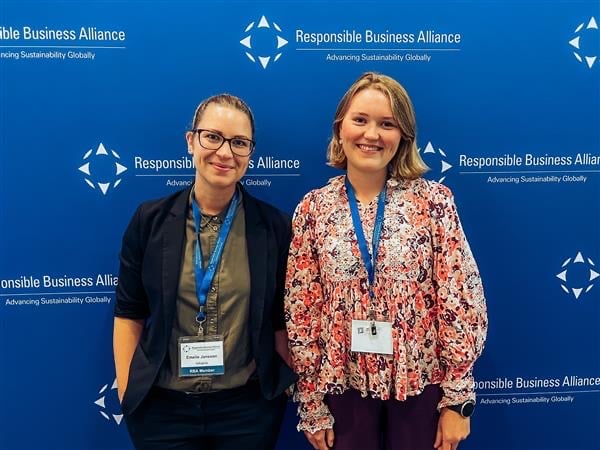The Responsible Business Alliance (RBA) Annual Conference 2023 took place between 16 – 19 October in Santa Clara, California. Almost 600 representatives from companies within tech and related industries attended the conference in person, with an additional substantial online attendance. The RBA is the world's largest industry coalition dedicated to promoting corporate responsibility within global supply chains. This year’s conference explored topics such as upcoming legislation, artificial intelligence, human rights, the power of data, and the green transition.
Advania was represented by Emelie Jansson, Business and Human Rights specialist and Head of Group compliance (Sweden) and Emilie Halland Braathen, Sustainability Manager (Norway). Here are some of their key takeaways:
Key Takeaways from the RBA conference 2023:
- Legislation in the spotlight: Anticipation around impending and existing regulations that impose increasingly stringent requirements on companies for reporting, transparency, and human rights due diligence. Examples include the CSDDD, CSRD, as well as transparency acts in Germany and Norway.
- The power of data-driven decisions: Effective adoption of sustainable practices, from water conservation to renewable energy, relies on rigorous data analysis. The current shortcomings in environmental and climate data accentuates the need for improved ESG reporting.
- Addressing forced labour: The issue of forced labour is a modern challenge, affecting 27.6 million people today. Combating forced labour and human trafficking requires on-going and forceful efforts, with a crucial role played by companies' human rights due diligence processes.
- The role of AI in sustainability: AI will become embedded into all systems in the coming years. Many tech giants stressed that while AI can effectively process sustainability data, human insight is pivotal for creating impactful sustainability strategies. Advances in technology must be careful of unintended consequences, such as negative human rights impacts.
- Critical mineral demand and land competition: The tech industry's transition to greener practices elevates the need to use land for the sourcing of critical minerals and green energy infrastructure. Equally, land increasingly required for agriculture expansion to meet the needs of a growing population. Meanwhile, the preservation of biodiversity is vital for the health of the planet, and any land acquisition must respect the rights of indigenous communities. How do we balance these competing needs?
- Grievance mechanisms – an essential tool in stakeholder engagement: The risk of severe human rights violations is primarily found within SMEs operating in the sub-tier levels of the supply chain, and affected workers encounter numerous obstacles in accessing remedy. Trusted, operational grievance mechanisms enable workers to report misconduct and is an essential tool to enable valuable engagement with stakeholders.
- Push for renewable energy in manufacturing: Many manufacturing plants are situated in Asia, with low supply of renewable energy. According to a recent report from Stand Earth, there is a need for collaboration towards encouraging governments in these countries to transition to renewable energy, necessitating international community support.
- Sustainability beyond silos: Many enterprises structure sustainability goals in isolation, leading to potential trade-offs. The future calls for integrating these goals, focusing on core stakeholder values. Equally, sustainability data need to be standardised within the industry, as well as across industry borders.
Finally, it is increasingly clear that there is an intrinsic connection between climate change and human rights; one area of sustainability cannot be considered without the other. Digitalisation plays a pivotal role in meeting global emission reduction targets but is also associated with significant challenges, for example how we meet the increasing demand for tech and innovative solutions while safeguarding the rights of people and communities throughout the value chain.
No single actor sits on the answer to these challenges, and we are grateful for our membership in the RBA which not only provides us with a global platform to learn from our peers but also serves as a forum where collaborative efforts can be harnessed to address industry-wide challenges. At Advania, we continue to drive an ambitious sustainability agenda to contribute to emission reduction targets and combat shared challenges, such as GHG scope three emission reporting, the right to a living wage for workers in the supply chain and proactive measures within cyber and information security.

 Written by
Advania
Written by
Advania



